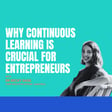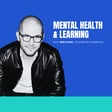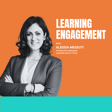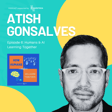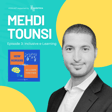Become a Creator today!Start creating today - Share your story with the world!
Start for free
00:00:00
00:00:01

AI and eLearning: How GenAI is Shaping the Future of Education
In the fourth episode of the podcast, host Lauren Anders Brown sits down with Ryan Hazen, instructional technologist, TEDx speaker, and a key figure at Moodle, the free and open-source learning platform. Together, they delve into the complex and evolving role of Generative AI (GenAI) in education, unpacking its potential, ethical implications, and the future skills learners need in an AI-driven world.
Find more about Ryan Hazen
Website: moodle.org/plugins/mod_gamoteca
LinkedIn: https://www.linkedin.com/in/ryandhazen
Transcript
Ethical Implications of AI in Education
00:00:00
Speaker
The ethical implications of integrating AI into education are still undecided by many. From moral education and inclusive prompt engineering to critical analysis of AI-generated outputs, we'll discuss the growing concern among educators and parents alike, the fear of using generative AI in classrooms.
Podcast Introduction: How Humans E-Learn Together
00:00:25
Speaker
I'm Lauren Anders Brown. Your host for this episode, and we're going to explore more about this topic with our guest speaker, Ryan Hazen. You're listening to How Humans You Learn Together, discussing the impact human connected interactive experiences have on the human capacity to learn. This is a podcast for educators, learning and development professionals, coaches and mentors, the technology and design community,
00:00:51
Speaker
and anyone who wants to leverage new ways to reach lifelong learners, and a look at what others in the e-learning industry are doing to make that happen.
Guest Introduction: Ryan Hazen
00:01:00
Speaker
I'm here today with Ryan Hazen. Oh, hi. Ryan is an instructional technologist and a TEDx speaker. A student had had a hard time with a particular assignment, and I was speaking with my principal about it, and he said to me, every student should be able to find success in your classroom.
00:01:20
Speaker
And that impacted me in a way that changed me from student to teacher. As a student, I was always focused on achievement and meeting the standards and doing the best that I could. Whereas as a teacher, I realized that it was my responsibility to include everyone in the classroom and the learning experience. He works at Moodle, a free and open source learning platform.
00:01:43
Speaker
I am a learning designer and sales executive with Moodle. It is the largest and most used learning management system in the world. ah There are 411 million people using Moodle in the world right now. And our software is open source, meaning that you can download and use the software royalty-free for your organization on your own servers.
Understanding Moodle and Its Global Impact
00:02:06
Speaker
For Moodle, I help set up premium hosting services for organizations that want to host Moodle in the cloud and have Moodle experts support their infrastructure, learning design, and custom development of their learning management system. Thanks, Ryan. Moodle is such a fun word to say, by the way. I just want to throw that out there before we get into it. It is actually an acronym. i Yeah, it stands for Modular Object Oriented Dynamic Learning Environment.
Generative AI's Effect on Learning and Engagement
00:02:39
Speaker
I'm not going to remember that today, but I might in the future, but I also love that it it's an acronym. That's pretty cool. um Okay, cool. So let's dive right into it. What is Gen AI and how is it connected or disconnected to learning in general?
00:02:57
Speaker
Generative AI is artificial intelligence that generates a response to a human prompt. So this response could be text, it could be image, it can be video. So essentially a human asks this AI platform to provide some response to a prompt and it will provide it.
00:03:22
Speaker
In far as it is connected to learning, um we have legitimate concerns in the educational sphere about how generative AI affects students' ability to generate their own responses to prompts. So I think our concern is that students will be relying on software to respond to writing prompts, to respond to artistic prompts, to respond to teachers in a way that robs those students of the cognitive engagement with the material that these artifacts are meant to represent. If you didn't write your paper, you didn't think about the content and you didn't learn the content that the paper is meant to be a representation of your cognitive journey with. Interesting. ah Using then Gen AI in e-learning,
00:04:18
Speaker
What role does it play when it comes to e-learning rather than in classrooms? I think what you just described is maybe a little bit more of an in-person instructional thing, but like how would it play play out in e-learning? Because obviously if if students are kind of isolated in their own parts of the world and are all coming together, is there ah a way to get around this idea of ah not writing your paper or using Gen AI to write the paper and just submit it?
Ensuring Authentic Learning in E-Learning with AI
00:04:47
Speaker
Well, I think the stakes are higher and it's a little more difficult in e-learning to verify that students have cognitively engaged with the material they're supposed to learn. In a classroom, you can speak directly to a student. You can have them answer questions. You can have them demonstrate their mastery of the content in a human to human way.
00:05:10
Speaker
In e-learning, we tend to rely on asynchronous responses to prompts. So we don't see the student always working with the content in e-learning. They will receive a prompt from the teacher, go off and write the paper, submit the paper back to the teacher.
00:05:28
Speaker
without the teacher having any oversight of that process. So it's a little more difficult to ferret out when students are doing authentic cognitive engagement with your content and when they are not um not engaging with the content in favor of AI, for instance. Right. OK. So that's one way that we, you know, that Gen AI is, I guess, makes a barrier or is a bit of a challenge in e-learning.
00:05:55
Speaker
What ways could it be beneficial? You know, I think you mentioned the teachers, right? Because it's obviously still human connected. So um can Gen AI help the the teachers or the instructors in this case? AI ah gives us the capacity to refine our responses after we've mastered the content. So as long as we place AI in a position where We're not asking it to generate our opinions and our perspectives for us. It can help us refine our expression of our opinions and our understanding. so
00:06:32
Speaker
Using AI can be useful as long as we are giving the answers to the real questions that we're approaching in our courses to the AI in advance and just having it formulate our responses for us and give us a um a more refined edge to something that we already understand from a theoretical or a content perspective.
00:07:00
Speaker
Okay. And then what if someone doesn't understand, have that, you know, that foundation, that theoretical content, are there risks involved then when using gen AI? Absolutely. It can deprive the student of their opportunity to engage faithfully with the content. Learning is ah a privilege really. It's a chance for us to encounter new content and grow in our understanding of the world through rigorous engagement with things other people have provided us.
Adapting Education to AI: Lessons from the Past
00:07:33
Speaker
And if we're relying on AI to do that work for us, we're not having the opportunity to really stretch ourselves and grow. And I speak with a lot of um teachers, a lot of higher ed faculty, especially who are
00:07:50
Speaker
having essays submitted to them that are written by Gen AI. And even though the essays are well written, you can tell when a student does not understand the content because they will allow the AI to fill in the blanks of the things that they're supposed to be understanding, the things that they're supposed to be learning. And you can see in the paper that it's well formatted and it's well written, but it doesn't have the content that they're supposed to be understanding in it. It's obvious, even though AI has written the paper for them. Right. Okay. I mean, that's obviously everyone's biggest fear. So how do we, as humans, if we want to learn more and and use gen AI in a positive way, what's our responsibility when it comes to using gen AI? Well, it really is just a new spin on an old problem. These concerns we have about
00:08:48
Speaker
AI-based plagiarism. We've had essay mills, we've had plagiarism for a long time, and that has the same impact, the same negative impact on the student of depriving them of an authentic chance to interact with content. So if we look how we have approached the advent of technology and education in general over the past few decades, we have gone from
00:09:14
Speaker
fearing technology in the classroom to embracing it. um When computers came about, we didn't stop students from using them. We actually changed the way we educated students so that they could leverage computers to their benefit. We're now teaching students how to code. We're teaching teaching students how to 3D print. We're teaching students how to use technology in positive ways that impacts their learning in a way that keeps them engaged with the content rather than depriving them of it.
Training AI: Avoiding Biases and Promoting Inclusivity
00:09:50
Speaker
So
00:09:52
Speaker
We should really approach JNAI in the same way that we approached technology in general ah in education. That is, with a focus on leveraging it, rather than a focus on how it has ah changed the way we were doing things before. Right. So we need to kind of also take into perspective that if we want JNAI to teach us, we kind of have to teach it first, right? Oh, absolutely.
00:10:20
Speaker
the Yeah, and that gets into to what sort of data that we feed our AIs and and sort of the ethical implications of AIs generating content for us. What are some of those ethical issues at stake? Well, Gen AI is only as good as the information that it is trained on. We have to remember that Gen AI is a In text, it's a predictive text model. It takes what it has been provided and bases its responses on those inputs. So if we without if we feed AI information from our history without caution,
00:11:07
Speaker
we can very well create an AI that carries the biases of the text that it's been fed. So if you feed AI ah racist or um sexist content, the AI itself will spit that same opinion back out to its learners. So we have to be very cautious about how we train our AI to think about things. Well, think is the wrong word, but we have to train our AI on texts that are consistent with our modern social values. Is it, I hate asking this question, but is it possible to weaponize AI in the way of, you know, I guess like hate speech or, you know, in a negative connotation for, you know, as in teaching negative attributes to learn, I guess.
00:12:03
Speaker
Well, any tool is a weapon held by someone who has malicious intent. So yes, absolutely. um A good example of how this has already happened is there is an AI called Tay that was created and released on Twitter and ah malicious actors on the internet fed it um racist, sexist information and it became the sort of the worst version of our ah social collective consciousness um very, very quickly. So not only is it possible, it's actually happened. And how do we avoid that? what is What's an example of the opposite of of that kind of AI usage, one where we could be like an inclusive prompt that
00:12:55
Speaker
you know, that we should be focusing on when it comes to using AI. Well, that's a struggle that we are having in real time right now is how do we train AI to appropriately reflect where we want our society to be rather than reflect where it has been.
The Role of Humanities in Understanding AI's Moral Implications
00:13:13
Speaker
A good inclusive prompt would require the human who is requesting a response from an AI to deliberately include marginalized people in its response. For example, if you're asking an AI to create a education plan for a person to become, I don't know, a business executive or something, you would
00:13:43
Speaker
want to make sure that you specifically ask that AI to include avenues for folks who don't have access to higher education or who are marginalized or ostracized in various ways to to provide that response that's appropriate for all people. So everyone who is following such a ah development personal development plan um can see themselves in it rather than something that's obviously for a very traditional sort of middle of the road privileged person in our society. It's a bit difficult to think that you know something that's kind of you know could be quite leveling when it comes to inequality or inequity um could actually have the opposite impact or effect Yeah, for certain. And there are profound moral implications for this and profound implications for education.
00:14:44
Speaker
One thing for me going into a future where Gen AI is part of our social landscape is a renewed, we need a renewed focus on the humanities. We need to be training our students in moral philosophy and in ethical philosophy so that they can understand the implications of what they are doing with these tools. Lately,
00:15:13
Speaker
ah I've been in higher education for over a decade. I worked at a college for many years before I worked directly for Moodle. And one of the things that modern students are really focused on is I need to be trained for the trade that I'm going to be in. Teach me how to code. Teach me how to nurse. Teach me how to be an accountant or practice law or whatever field they want to get into.
00:15:36
Speaker
And there's a ah lack of focus on the humanities side of things. Students don't see the value of a philosophy course. They don't see the value of a literature course that might teach them soft skills and things about humanity that aren't just, how do I do my job? Those are becoming more and more important as humans become the protecting factor against AI that isn't able to understand the moral implications of its actions.
Programming AI for Ethical and Responsible Outputs
00:16:13
Speaker
There's more of a focus on a learning path to have those soft skills, I guess, rather than um just focus on the curriculum itself, because that can easily be replaced as as we're learning in some instances. Absolutely. And we should think of ourselves as the stewards of a just and moral humanity
00:16:34
Speaker
that AI as of right now ah is not able to handle on its own. And how would we get to a place where gen AI could handle and be a guide for us? You know, how could we, in what way, like, could we program AI, change some of our
00:17:00
Speaker
It is possible, I think, that we can program AI to be better at it than it is now. And we've seen um they we've seen these AI tools start generating very direct prompts, you know, if you go and you ask chat GPT to generate a racist, exclusive, harmful response, it will refuse to do so because it has been programmed ah to do that. However, even if we, as we continually improve AI's programming to generally generate morally responsible responses,
00:17:48
Speaker
we still have to run that through our human evaluation filter. Is this really what I intended for the AI to do? And is this consistent with my values and our values as a society when evaluating prompts from AI? So I think another really interesting place that we can look at ah ways in which um taking a positive approach to Gen AI and the positive aspects that I can have is is history, right? um And, you know, histories written by the ones who want it to be remembered in a certain way. And, you know, the idea of history books, I think in general, the way that they were before um was controlled according to the audience that was either publishing them or distributing them or receiving them.
00:18:36
Speaker
And just out of curiosity, I just looked up, I just pointed to chat GPT, what is the name of the war that happened in Vietnam? um Because in American history books, we all know it as the Vietnam War, but actually in Vietnam, you wouldn't call it the Vietnam War, it's actually called something else. And you know what's really cool, Ryan, is I just put it in and it came up with both answers. Oh, wow. That's great.
00:19:02
Speaker
So it's the commonly known as the Vietnam War, or in Vietnam, it is known as the Resistance War against America or the American War, and even says it in Vietnamese. Well, that's a good example of AI becoming more inclusive and more considerate of the fact that there are multiple perspectives on things that happen in history.
Incorporating Diverse Perspectives in AI Content
00:19:22
Speaker
That's a really positive really positive thing.
00:19:25
Speaker
Yeah, and I think, you know, as far as inclusive prompts, those are the kinds of things too that we have to be thinking, like thinking of the whole audience, which can take a lot of lot of imagination, and a lot of work, and we don't always, our brains don't always think that way, right? But, you know, there's so much more that we can learn. If someone else just looked up, you know, what is the war that happened in Vietnam, then they'd be, they might be educated on the fact that it actually had two names. Absolutely.
00:19:48
Speaker
in that sense.
Emphasizing Human Creativity and Innovation
00:19:49
Speaker
So what other future-looking skills should we be ah teaching people in a world of Gen AI? I know we we touched on a couple of them, but any kind of last thoughts of ah of takeaways that we should be considering when people are exploring Gen AI either the first time or they're using it on a daily basis?
00:20:09
Speaker
we should be privileging creativity and innovation in people, because that is the thing that I have yet to see AI really be able to do. I was thinking about this the other day. I was listening to an old album by REM out of time, and there's the song on it, Losing My Religion, and the main riff in it is played on a mandolin. Now,
00:20:40
Speaker
you wouldn't expect to hear a mandolin in an alternative rock song in the early nineties. In fact, it was so out of the ordinary that the publishing company did not want to send it to the radio stations because they didn't think it fit the mold. Now, if you had asked generative AI to create an alternative rock song before losing my religion came out, you could ask it to generate a thousand alternative rock songs and there would never be a mandolin on any of those tracks. However,
00:21:09
Speaker
It is the human innovation of the musicians and REM that recognized that this was going to be a novel and engaging change in the way that alternative rock was created. And therefore, you know, it takes the human to do that innovative stuff. And, you know, this was a song that was atop the charts for, I don't know, 20 weeks or something like that. it's You can probably hear that mandolin riff in your head right now if you're of a certain age. So um I would privilege innovation, creativity, and ah moral philosophy and students because we don't need them doing wrote repetitive things. We need them innovating and critically thinking about the content that they're being offered. I guess that's an interesting way to look at Gen AI, that it's a collection of things that have already passed.
00:22:02
Speaker
Even if it just passed like, you know, five minutes ago, it's still passed. It's not what could happen present and could happen, you know, or be created in the future. Yeah, that's very much the way that I look at generative AI is it helps us standardize our thoughts into a format and the way that people have already done things but it's not going to innovate for us. It's not going to be a creative force in the world that fundamentally changes the way that we think about things, which is great because it refocuses humanity on what it does best while taking some of the
00:22:43
Speaker
work out of that innovation.
00:22:49
Speaker
Well, Ryan, I think we covered a lot when it comes to ethics and gen AI and everything kind of in between. And I just want to say thank you for joining us. And if you'd like to get in touch with us regarding today's episode, previous episodes, or anything else, send me an email, Lauren at Gamoteca.com.
00:23:08
Speaker
That's all for this episode on How Humans E-Learn Together, supported by Gamoteca. Until next time. Goodbye. Goodbye. Thanks for having me.
